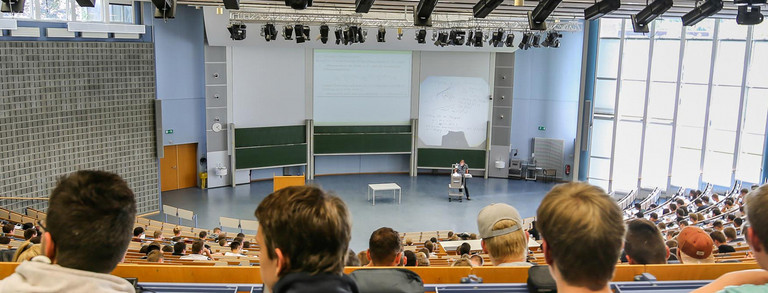Sociology
Summary
| Degree | Bachelor of Arts (B.A.) |
|---|---|
| Subject group | Social Sciences and Cultural Studies |
| Standard program duration | 6 semesters |
| Admission requirements |
none
|
| Start of studies |
Winter semester
|
| Language | German |
| Further information | Website of the Department of Social Sciences |
| Department | Department of Social Sciences |
Overview
We teach general sociological qualifications in the areas of „sociological thinking“, „theories“ and „social structure“. Two of six central fields of social change are selected and studied in depth: Social Inequalities/Cultural Differences, Life Course/Biography, Health/Well-Being, Work/Organization/Technology, Knowledge/Education, and Environment/Innovation.
In the area of methods, both directions are learned: qualitative-interpretative as well as quantitative research methods; research workshops enable research-based learning on concrete practical examples.
A special highlight of the study program: the semester abroad is firmly integrated and you go abroad for half a year to a (partner) university: other study and life contexts are waiting for you before you start your Bachelor thesis at the TU Dortmund. During the course of your studies, English-language events are offered and foreign ‚incomings‘ enrich your studies with their perspectives.
Courses on professional fields and key qualifications, writing workshops and language courses offer additional qualifications for professional practice.
Skills and knowledge
Above all, curiosity is called for! It will be a lot about questioning („everyday“) situations and generally asking the question whether and why things that are „just the way they are“ are actually the way they are.
One should therefore have an interest in questions about social contexts and about individuals. In everyday life, too, we constantly find explanations for the actions of others as well as their causes. Sociology as a science is characterized by the fact that it is not satisfied with short-cut everyday explanations - in the interest of avoiding prejudices and generalizations. Therefore, the willingness to get involved with new things is as important as a high level of motivation.
Knowledge of English is very useful - at the latest helpful for the semester abroad - but no proof is required for admission to the program.
In the area of methods, we train in both directions: qualitative-interpretative and quantitative; statistics will therefore also be a component, but here, too, no special proofs are necessary beforehand.
Field of activity
The course prepares students for jobs in various professional fields and industries, nothing with outdated clichés. The special thing perhaps is that it is not always so clearly defined. Therefore, in the study: develop a profile by choosing events or topics and set priorities.
Where are sociologists sought after?
- Universities, universities of applied sciences, vocational and technical academies, non-university research institutes,
- Media (e.g. radio and television stations, online media, etc.),
- Market and opinion research,
- Institutions of official statistics,
- Publishing houses (e.g., specialist editorial departments, editorial offices),
- Education and culture/sports (e.g. adult education, public relations),
- Corporate and public relations consulting,
- Healthcare (e.g., quality management or corporate health management),
- Public administration (health, education, culture, urban planning and social services),
- Political parties and other interest groups, associations or organizations (state/federal parliament, business and professional associations, foundations, NGOs),
- Administration of private companies, such as industry and commerce.
Additional information
Components of the program include study abroad in the fifth semester and a complementary subject beginning in the first semester. Students can choose from the following subjects: Applied Literature and Cultural Studies, Applied Linguistics, Education in International Perspective, Protestant Theology, Journalism and Science Communication, Cultural Anthropology of Textiles, Music, Political Science, Psychology, Rehabilitation Education, Sports, Urban and Regional Sociology, Statistics or Economics.
What's next? With a Bachelor’s degree program in Sociology, enroll directly in the Master’s degree program in Sociology!
In the Master’s degree program, 6 modules are studied in the (elective) compulsory area as well as the module for the Master’s thesis. There are many points of connection to the fields of social change, but no duplications.
More information about the Master’s degree program can be found on the website of the Faculty of Social Sciences.





![[Translate to English:] Partner Four hands are holding the green logo of TU Dortmund University](/storages/tu_website/_processed_/1/d/csm_Partner_Nicole_Rechmann_KW_670eba0154.jpg)




![[Translate to English:] Forschung An apparatus with tubes in a laboratory](/storages/tu_website/_processed_/0/c/csm_Forschung_Juergen_Huhn_4fa3153b51.jpg)
![[Translate to English:] Studium Five students are sitting in a lecture hall. They are talking to each other.](/storages/tu_website/_processed_/c/9/csm_Studium_FelixSchmale_dbdbfb0dd7.jpg)





